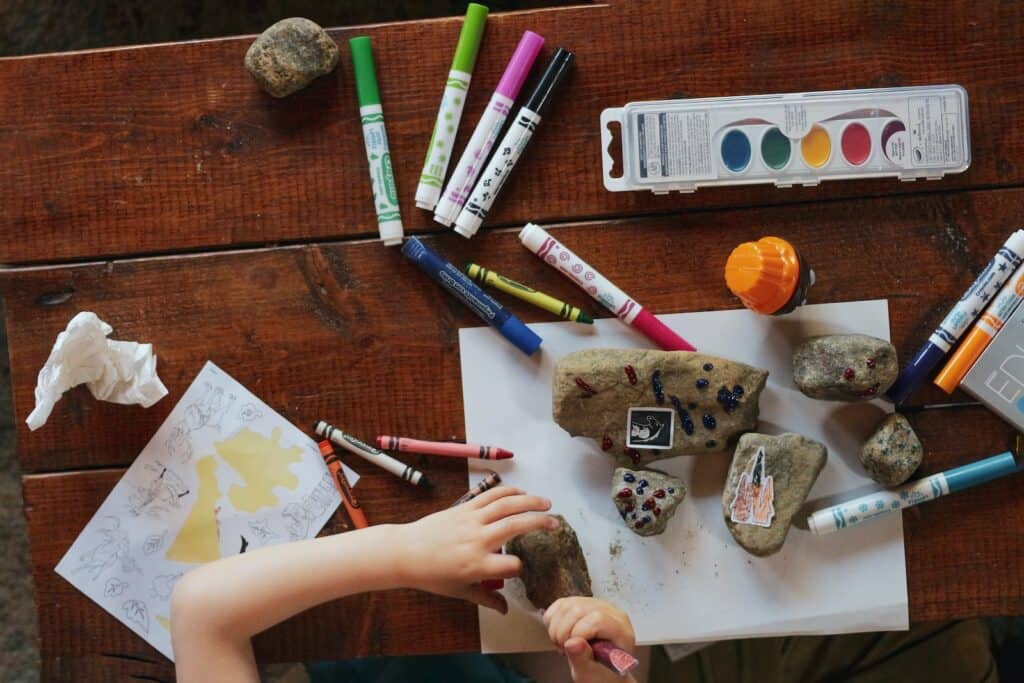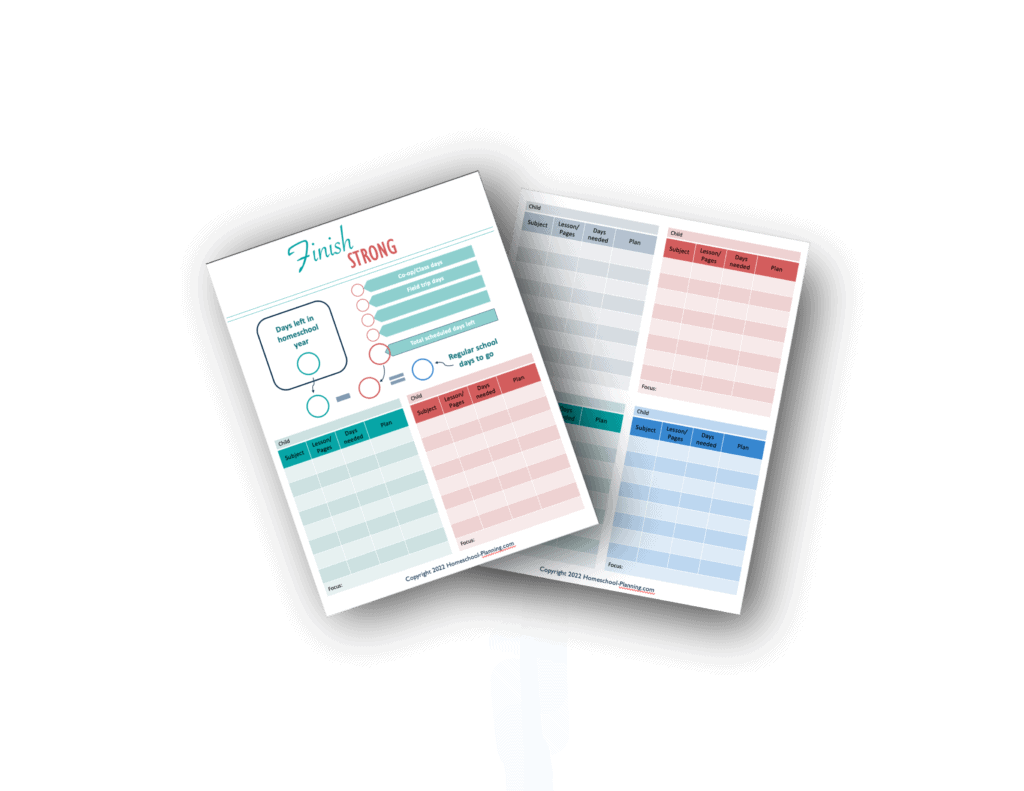Many homeschooling families easily get flustered when it comes to whether or not you have to finish homeschool curriculum. There are so many questions that come up, and hot debate surrounding it all. You may be highly opinionated and honestly, I can be too! But in the end, each family gets to decide for themselves what their homeschool will look like.
In this post, I will tackle all the common questions and topics surrounding finishing homeschool curriculum. We will also lay out 7 great tips for wrapping up your homeschool curriculum in a solid way. Let’s get started!

Do I have to finish my homeschool curriculum?
You’re obviously wondering if your kids have to finish this year’s homeschool curriculum. Well, the short answer is no! You don’t have to finish any curriculum. It’s only a guideline for what your child could learn within a year’s time.
But is it really that simple?
The real measure is whether or not your kids have been learning well. And truly, learning never ends.
As homeschooling parents, ultimately we get to decide what our kids learn and when. So if that means finishing the curriculum, then do it.
But if you want your kids to learn bits and pieces of what’s in the book and fill it in with lots of in depth exploration of topics, that’s fine too! Or if the entire book is just too much for what you feel you can do in one year, no need to cram it all in just so you can check the box.
Check your laws
When thinking about what needs to be done in your homeschool, it’s important to remember your state laws. Most US states have some sort of laws for homeschooling. Some of them are very general and vague, while other states have more specific laws.
Find more about your state laws at the HSLDA website.
Common things these state homeschool laws will include:
- Attendance (days or hours)
- Subjects
- Standardized testing
- Samples of work
- State reporting paperwork with deadlines
- Child’s age for compulsory attendance
Unless you are enrolled in a program that requires this, you will not usually need to verify what you have completed within a year’s time. Typically what is required is that you are doing some sort of learning for a given amount of time.
So most of the time, the choice is up to you to decide what you do each year and how much you complete of a resource.

Consider what is important
When you’re thinking about finishing your current curriculum or not, first you need to consider what is important in your homeschool. If your goal for homeschooling your kids this year is to complete a set of curricula, then you will probably do what it takes to complete that goal this year.
However, many homeschoolers will look beyond this initial idea and think in a broader sense of helping their kids to learn and explore, however that may look. If this is more the case, then we can step outside of the box of the curriculum a bit, see the big picture, and be able to let go if things don’t go quite according to our initial plan.
Some things that may keep you from finishing homeschool curriculum on your planned timeframe:
- Not everyone learns at the same pace.
- Not all children are interested in the same things.
- Some curricula have a lot of unnecessary busywork.
- Life happens and we have to prioritize in the moment.
- Our initial plans might have been too intense.
- We might like to explore a topic more than the plan allowed.
- We got stuck on a new concept (in Math).
- I miscalulated what we could get through.
- My kids really struggled.
Allowing a little grace for yourself and your kids can be helpful in your homeschool. Focus on what is important to you and their learning. Looking at the big picture will relieve some of the guilt you may feel from not finishing your plan.
No laziness allowed
Most homeschoolers don’t tend toward this, but ocassionally we don’t finish our curriculum because of laziness. If this is you, consider this your kick in the pants.
While children learn a lot through play, there is still a lot of encouragement we as parents need to be doing. Be sure you are filling your kids’ lives with lots of opportunity for learning. Great toys, books, new experiences, challenging their thinking. Always pushing them forward to new things.
You WILL receive pushback from your children when it comes to being diligent with learning. Hard work is not a natural incliniation for most people. It is taught.
So you also must be diligent. Be the parent and encourage hard work. Be a model of learning yourself, and they are more apt to follow.
Now life happens. And we can all get a pass for hard times. But if you aren’t trying to push through the hard times and teaching your kids that life is hard and we still have to work through it, then you are missing an opportunity.
- Is my happiness more important than my children learning?
- Am I sacrificing their future by not encouraging hard work?
- Are my kids actually learning?
- What can I do to help them learn?
- In what ways can I challenge them to learn more?
If you are struggling with laziness in your homeschool, I suggest using a light curriculum that will keep you on track. Make homeschooling a priority in your days and work through the plan. When you get good at choosing homeschooling over other things in your life, then it will be easier to make wise decisions with your day and curriculum.
Read: The Hardest Part of Homeschooling is Not the Kids

Who decides?
So who gets to decide what your child learns each school year? Well, this is the true beauty of homeschooling – YOU do! To some this is freeing, while you may be scared out of your mind after reading that!
This is where homeschooling curriculum comes in. If you are overwhelmed by the throught that your child’s education lies in your hands and you have no idea what to do, get a curriculum for their level and work through it!
This is what most homeschooling families do. Why reinvent the wheel? I can pick up a few books each morning and work through them and we’re done. But luckily that’s not the end.
Even when you use a curriculum, you still get to decide how to use it! You can change it, add to it, skip things, and dare I say it? You can even not finish it! The choice is yours.
Read: 10 Easy ways to make any homeschool curriculum work for you
As a homeschooler, you ultimately have the ability to give grades and attendance. You get to decide when your school day, and even your school year, is complete!
What does complete mean?
If you speak to a public school teacher, many of them will tell you they never finish a text book in a year. So with that information, what does a complete school year even mean?
Many will suggest you complete at least 75-80% of the content of the resource. You might not do every question and read every paragraph, but if you are doing most of the book, you should feel good about calling your year complete.
Of course, be sure you are not short-changing your children in the process.
You also should double check you have met your state’s laws regarding attendance.
Your family may really like to pursue rabbit trails as you learn new concepts. So you “get behind” in your homeschool curriculum by diving further into new ideas. Challenging more depth on a subject is not being behind. But understand you will not complete the curriculum at the designed pace and should allow time for those rabbit trails. That’s totally ok!
In this case, rather than completing the curriculum, it may better to consider your year complete by counting time. This could be your school days, hours, or both. This also works well for those who aren’t using a curriculum.
When you reach 180 days of school (or whatever your state requires), you may be finished, no matter where you are in your learning. Or if you have completed 120-150 hours on a subject, your studies may be considered complete.

What if we don’t finish our homeschool curriculum this year?
Homeschooling parents have the ultimate authority on whether or not you finish your homeschool curriculum. There are several ways you can approach your curriculum near the end of the year. From just deciding to be done, to picking up next year where you left off, to focusing only on the big points.
What do we do if we decide our year is complete and we have not finished the curriculum? What are the options when it comes to completing the year in a solid way? Let’s discuss this.
1. Call it done
If you feel like your school year is complete, you can just decide to be done. If you have met your state attendance laws and think there’s no need to continue just for the sake of finishing a book, then by all means, call it done!
Your kids have learned and it’s the end of the year. So that’s all, the end. Check, check.
Sometimes taking breaks are the best thing we can do for our sanity. You and your child may need a little time off from formal studies and that’s totally fine! Going through the motions just to check another box is not always worth the difficulty. It’s ok to just be done.
Pros:
- Easy to implement
- No extra planning
- Start fresh next year
Cons:
- Unsure where to start in your curriculum next school year
- May “miss” topics you feel are important

2. Count time rather than completion
Another way you can confidently end your year is to count time rather than completion. You might be a family that enjoys lots of field trips and you follow rabbit trails when you reach an interesting topic.
Diving deep into a subject that isn’t allotted for in the curriculum plans may throw you off schedule but that doesn’t mean you shouldn’t do it! Really understanding a topic and following interests can be some of the best learning you can do with your children.
Then comes the end of the year and you still have lots of your curriculum left to get through. So instead of pushing through to the end of the curriculum, you could decide you are done. You have put in quality learning time.
Curriculum is a set of topics and lessons someone designed. It’s not a law that has to be followed.
You have completed the days and hours and have learned a lot. Count the quality time you put in and call it done!
Pros:
- Easy to implement
- No extra planning
- Start fresh next year
Cons:
- Unsure where to start in your curriculum next school year
- May “miss” topics you feel are important
3. Pick it back up next year
A really common way to deal with finishing homeschool curriculum is to pick it back up next year. When you reach the end of the year, stop where you are and when your new year starts, pick up in the curriculum right where you left off.
This works particularly well if you homeschool year round and take many shorter breaks throughout the year, rather than one big summer break. One school year just fades in to the next.
Even if you don’t school year round, many curricula will work well with taking an extended break in the middle. You learn a few things, then summer comes, then you get back into it after.
Some subjects can be difficult to do this with. Mostly subjects that build on themselves a lot, like Math. If you take a break more than a week or two long, many kids will have forgotten much of what they last learned. So picking right up where you left off will be difficult. They call this the “summer slide”.
You could fight this with a little review over the summer, backing up a lesson or two when you pick it back up, or even just continuing that one subject all year without long breaks.
Many other topical subjects, like writing, science, and history work just fine with extended breaks. Most of what is learned is similar from year to year anyways, just a little more in depth!

4. Finish up over your summer break
If you get to the end of your school year, but aren’t quite finished with your curriculum, you could extend your school year a tad and finish up over your summer break.
With this approach, you might just tack on an extra week to finish, or spread the work out over several weeks. One day a week, or shorter lessons each day can help keep kids from forgetting quite as much over a break and also help with some semblance of a normal routine.
If you just have a few more lessons and they all seem important to cover, it can be difficult to feel like you can just up and take a break in the middle of the curriculum. No one says you can’t make your own schedule and extend your school year a little to complete what needs to be done!
Pros:
- Can prevent some “summer slide”
- Can help keep your established routine even over break
Cons:
- Cuts in to your break time
5. Focus on main points
If you have quite a bit of curriculum left, despite your year being nearly done, you can focus on the main points and skip the rest! Perhaps you started your current curriculum mid-year or love following rabbit trails throughout the year yet you don’t want to continue this resource into next school year.
Take a look over the curriculum, looking at the main points. The Table of Contents is great for this. FInd a way to condense the information into a shorter time frame.
Maybe the curriculum plans on spending a week (5 days) on one topic. You could find a way to cover in only 1-2 days instead. If it has a lesson with 4 supplmental activities, just complete the one that looks the best. Or skip some of the supplemental reading.
If you focus on the main topics of the resource for the rest of the year, you can be sure to get the general ideas in to your child’s head without having the school year consume your break.
Pros:
- Only complete what is important to you
- Start fresh next year
Cons:
- Takes some time and planning

6. Skip what doesn’t matter
Another way to approach the end of the school year is to skip what doesn’t matter within the curriculum. Many times, curriculum ends up with lots of busywork to reinforce the ideas and topics. But kids don’t always need this to understand.
So take a look over the rest of the book. Any supplementary activities, wordsearches, extra writing practice all can be skipped if you feel it is not vital to your child’s learning. Of course I don’t recommend skipping all of this, just what you think is extra and unnecessary for your child.
Not all curricula have lots of extra work, so be careful not to cut too much out so your child misses out on learning the basics. But some have quite a bit and the workbook could be skipped all together! Do your kids really learn well from a quiz, test, or coloring page? Maybe the reading is all that you need.
7. Compare Tables of Contents
One little trick that may help you decide about finishing a curriculum this year or not is to compare Tables of Contents. Take the current book’s table and the next book’s then compare. You may notice similarities. It will help you make a confident decision for the rest of the year.
If you are using a curriculum that has levels, the end of one book is often quite similar to the beginning of the next. This is built in for review. Which of course is often helpful but also may be unnecessary for some children.
Some other books, like a grammar or writing curriculum, may be very similar all the way through from one level to the next. The next level may be a little more in depth, have a little more work to complete in each lesson, and maybe a few new topics.
But comparing the tables may help set your mind at ease if you are thinking about skipping some of the lessons or activities. They will likely be covered again next year!
Though occasionally you may find that each level is quite different. In this case, you will feel confident in completing the curriculum before moving on.
Pros:
- Can help relieve some guilt of not finishing or skipping things
- Make an informed decision
Cons:
- Takes some time and planning

Finish strong – free download!
Want a great resource to help you map out the end of your school resource by resource? Then download my free Finish Strong worksheets today.
This free end of the year guide will help you to look at each piece of curriculum, see how many lessons and days you still need and compare those amounts to the days left in your school year. Armed with this information, you can then make a solid decision of how to complete each resource this year.
After completing this free worksheet, you will have the confidence you need to make a strong finish with your homeschool curriculum.
Download it today!

Do you need to finish your homeschool curriculum?
Completing a homeschool resource or curriculum just for the sake of checking the box is often unnessecary. You are in charge of your homeschool and have the ability to decide when your year is complete.
If you have followed the attendance laws in your state, you have the ability to decide how you approach the rest of the year’s curriculum. It may be to complete it all or skip some things, but ultimately it’s your decision so you can feel like you completed your homeschool year in a good, confident way.
I hope this post has given you the confidence you need to finish your homeschool curriculum at the point that is right for your family.
Do you usually finish your homeschool curriculum every year? I’d love to know – comment below!


Related Posts
How to make any homeschool curriculum work for you
How to finish strong this homeschool year
Everything you need to know about homeschool attendance records











